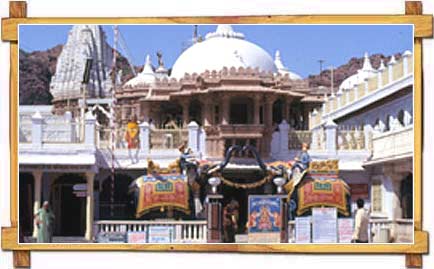

This side of the gate is called Moti Mahal. There are Two gates, one for entrance and other for exit. Before entering, we could see the pond in this place. Actually there are Twin ponds. There is close contact between these ponds and the Lord here. We find many shops selling pictures of the Lord. Pictures of the Lord, in various decorations inside, are available. Sri Srinathaji was originally in Brindavan. The Lord appears as Sri Govardhana Giridhari. For many Thousands of years, the Lord was in Brindavan. In circa 1726, He came to this place. One Daoji, had gone to Brindavan to worship the Lord. At that time there was an invasion and there was a necessity to protect the Lord. The Lord had commanded Daoji, to carry Him Westwards. Daoji took a bullock cart and with assistance of Two persons, he carried the Lord, wrapped in husk and grass, to this place. The trip took many days. The Lord had told Daoji, that he should stop at the place, which would be indicated. When the cart came here and tried to cross the pond, it could not. Daoji realized, that place might be His desired spot. With the help of King Rana Singh, he got the Lord installed in this place and a temple was built. From that time, Millions of devotees are visiting the temple and worshiping the Lord. The Lord's sannidhi is raised on some steps. Main Deity is Sri Srinathji. Besides, as Child, Sri Navaneetha Krishna is also gracing. In this temple Swami Vallabhacharya has done many services. Poojas are performed according to Vallabhacharya tradition. Each sewa is only for a few minutes, as the Lord is Child and He might not stand posing, for long! In our tradition, temples are opened in the morning and remain so, till noon; and, again, in the evening, when the sannidhi is opened at about 5 PM, it is kept opened till 9 PM or so. Here, at 5 AM the sannidhi opens and closed by 5:30 AM. Again harati at 7:15 AM and closed by 7:45 AM! Then again, between 9:15 and 9:45 AM; 11:15 and 11:45 AM. Like this for very short durations dharshans are available. We will see the Lord in the next day's lecture!
We will now see summary of Chapter 14:
gun.abandhavidh¯a tes.¯am.kartr. tvam.tannivartanam |
gatitrayasvam¯ulatvam.caturda´sa ud¯ıryate ||(18)
In Chapter 13, Sri Krishna told Arjuna that body was different from atman, both of which were different from the Lord. Kshetram was body, to be recognized as cultivable land. This is known by Kshetragya or atman. The Lord resides in both of them. Arjuna got the doubt, as to how the body was binding atman. One takes birth because of past karma and gets a body to reside. How body controlled atman? What Sri Krishna told as reply, is mentioned in Chapter 14, says Swami Alavandar: the three qualities bind atman in samsaram; actions are due to the inducement by the three qualities [by nature atman is not to do any action]; [does it mean atman can not get liberated?] means of liberation; the Lord only, grants the Three desires [of Bhaktas - wealth, Kaivalyam and Paramapadam, to serve the Lord for ever]. These four points are told in Chapter 14. In 14.2, He says that with the Gyana, described in Chapter 13, acquired, he reaches saadharmyam [that is, whatever is His nature, like Satyam, Gyanam and Anantam, he also attains the same. That is, by reaching Vaikuntam, this person also acquires equality with the Lord in these qualities. We have to note that this person does not become one with the Lord, as told by Sri Krishna]. Jeevatma's Gyana was covered by samsaram, and it is cleared. He further explains how each of these Three - sattva, rajo and tamo - qualities bind us. Sattvam keeps us in happiness and comforts, and binds us in samsaram [14.9]. Rajo quality binds us in desires arising out of action, tamo quality puts us in delusion. Sattva quality keeps one in happiness, good health and with knowledge [ 14.6]. Rajo qualitywill keep our desires enhanced [14.7]. Tamo quality will keep us in carelessness, laziness and sleep [14.8]. He, who understands that his actions are due to influence of qualities, and atman is not responsible, attains similarity with the Lord. Soul is inside body, formed by the Three qualities; and so influenced by them. In 14.23, the Lord says that qualities would be doing their nature, and why atman should get worried about that. We should be indifferent to them. In 14.25, it is said that if we keep ourselves away from worldly activities, with this knowledge, and be indifferent to praises and abuses, then we are considered to have crossed those qualities.
No comments:
Post a Comment